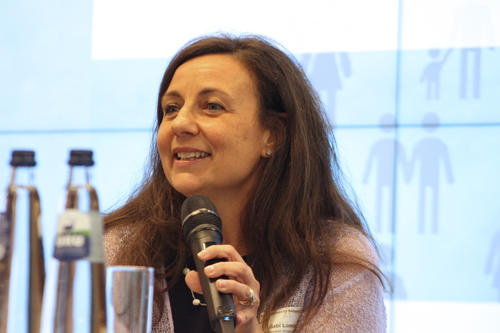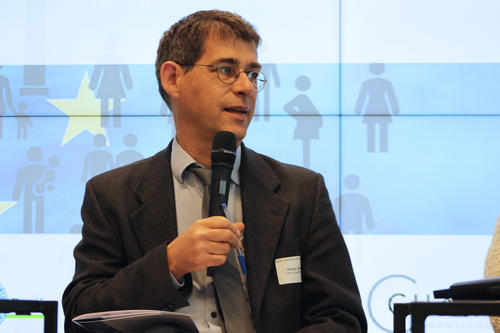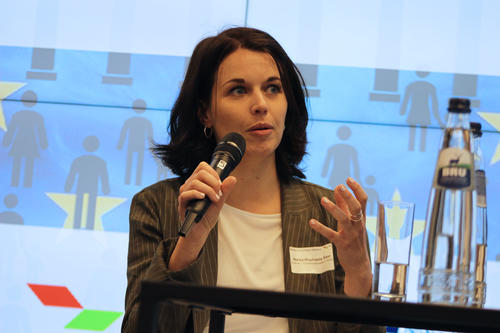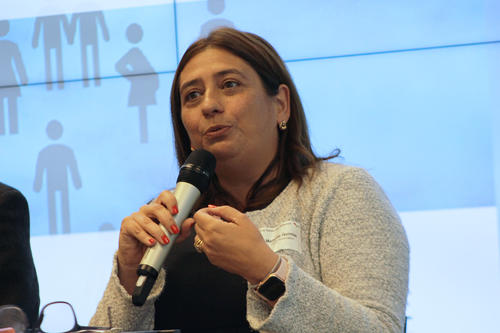Open Forum III: Full integration: Is evaluation the key to mainstreaming Social Sciences and Humanities throughout European Research
For a brief insight, we have picked out a few points from the discussion. If your interest is piqued, feel free to watch the recording of the event to dive deeper into the topic.
- Dr. Nadja-Raphaela Baer, Institute of Medical Sociology and Rehabilitation Science, Charité – Universitätsmedizin Berlin
- Dr. Klaus Jacob, Environmental Policy Research Centre, Freie Universität Berlin
- Dr. Gabi Lombardo, European Alliance for Social Sciences and Humanities (EASSH), expert in both higher education and global research policy
- Dr. Mafalda Quintas, Science Officer, COST Association
… first of all, let's change the perspective… the social science humanities has a research contribution, like any other science and doesn't need a special treatment, ...
… more than a third of the community of researchers is a social siences and humanities researcher... almost 70% of the students are enrolled in social science, humanities courses in the universities in Europe…
…We do so in different modes… a mode where social science is a kind of service function … a mode, a synergistic mode, where we do have the same subject areas but look at this from very different angels… with our own research question, and then we have a third mode, a challenging mode, where we look at the STEM science, how they pursue research…
…[In EU funding programs] it's very much in the first mode. Social science is a service for the STEM sciences, that's how programing is….
… there is still not an equilibrium between the still so-called "hard sciences" and "soft sciences". So there are still hierarchical structures and resulting power relations. …
…it kind of feels like you depend on individual actors or stakeholders, and the benevolence or interest of particular actors. And this, of course, reinforces power relations and makes it difficult to actually really do your science. …
…in an ideal world, I would like not to be asked to explain the value of my research…
…I was a very, very hard STEM person... in an ideal world we don't have integration or we don't have a reinforcement of SSH. We actually have co-creation among STEM and SSH researchers, because this is how we really need to work.
The global challenges, …. we move into a real cooperative and co-creation mode. That would be my dream.
…I really feel in my daily business that there are language barriers, even though we talk German or English… with respect to find common ground on research questions on work packages, etc… but then we don't have time to have to find common grounds in the first place…
…beneath those language barriers there are, of course, different cultures, disciplinary cultures and practices and I really think it's important to be able to switch perspectives and to get into an open dialog…
…Someone has possibly also bear into mind that before going into research, you have to win the grant for the research, and that's difficult to have an interdisciplinary proposal fairly evaluated…
…You need a good evaluation committee for this…
…and from the individual perspective it's also, yeah, it's a risky career to develop a profile as an interdisciplinary researcher, because you are evaluated by the different communities in their own disciplinary categories. And that's a risk to be expert in two or even more disciplines…
…We need to have panels that are fitting what is in the proposals. We would never put a proposal of biology in a mathematics panel. But somehow we find it acceptable that interdisciplinary proposals are evaluated by mono disciplinary panels. And I think that this is here a main problem for the interdisciplinarity research…
...First of all, evaluation is not an end in itself, it is a process to achieve something…
I would have thought that if you have a call and you want specific things, you have a panel, which is a panel of experts on the call, and that panel analyzes any project coming through the door. On the other hand, for the bottom up you would assume, since the thing is bottom up, you pick the project not with a fixed panel, because you can't cover all the expertise, but on the basis of the project that you get through the door. We have exactly the opposite situation…
…I think evaluation follows, especially here in Brussels, I would say, the program. And the programs are not yet fully clear in terms of what is the added value of integration and interdisciplinarity…
…If I look at the Missions and what is behind the Missions, it's about system change. And systems are social systems, socio-economic and social-technical systems, they work together, they cannot be understood from one perspective only. And the third mode, I would say challenging STEM from a social science perspective does make them better… if you have it in programs, you will also have it in evaluation…
… Indeed, before the beginning of Horizon 2020, we reformulated our evaluation system… we used the keywords because we are a bottom up program and we went to a panel free evaluation. …We also looked at the evaluation criteria, …we don't have fixed evaluation criteria. …. to be able to tailor each proposal to what is really needed.
And what we've seen is that a proposal submitted for COST that is interdisciplinary has exactly the same chances of being funded as a monodisciplinary proposal. …So we really believe that this is a push to support the interdisciplinarity research as a way to solve the global challenges…
… what is this “SSH”? … they are sociologist, economist, political scientist, a philosopher, and so on. You need to understand what kind of expertise you need for your projects…. Also, it is not the same if you are addressing an issue from the economic point of view because you are targeting an economic policy or actually if you want to see the impact on certain patients because actually you're trying to change a health policy and then you need a very different expert…
…Today the cluster which is SSH driven got 2.1 billion, which never happened before. So things are changing…
…I do believe that we should focus on the ideas first and then the ability to deliver on those ideas. And of course, the bibliometrics, it's not always the measure for the ability to deliver. …
…I experience those tensions daily… the whole quantification and within this neo liberal society and the developments, technological developments perhaps also hinder us a bit from trusting also. …trust also in the researchers and in what they think should be important. … not only the researchers, but also what are the target group's needs and etc. should be way more in the center than the quantification, measures and evaluation criteria. …





